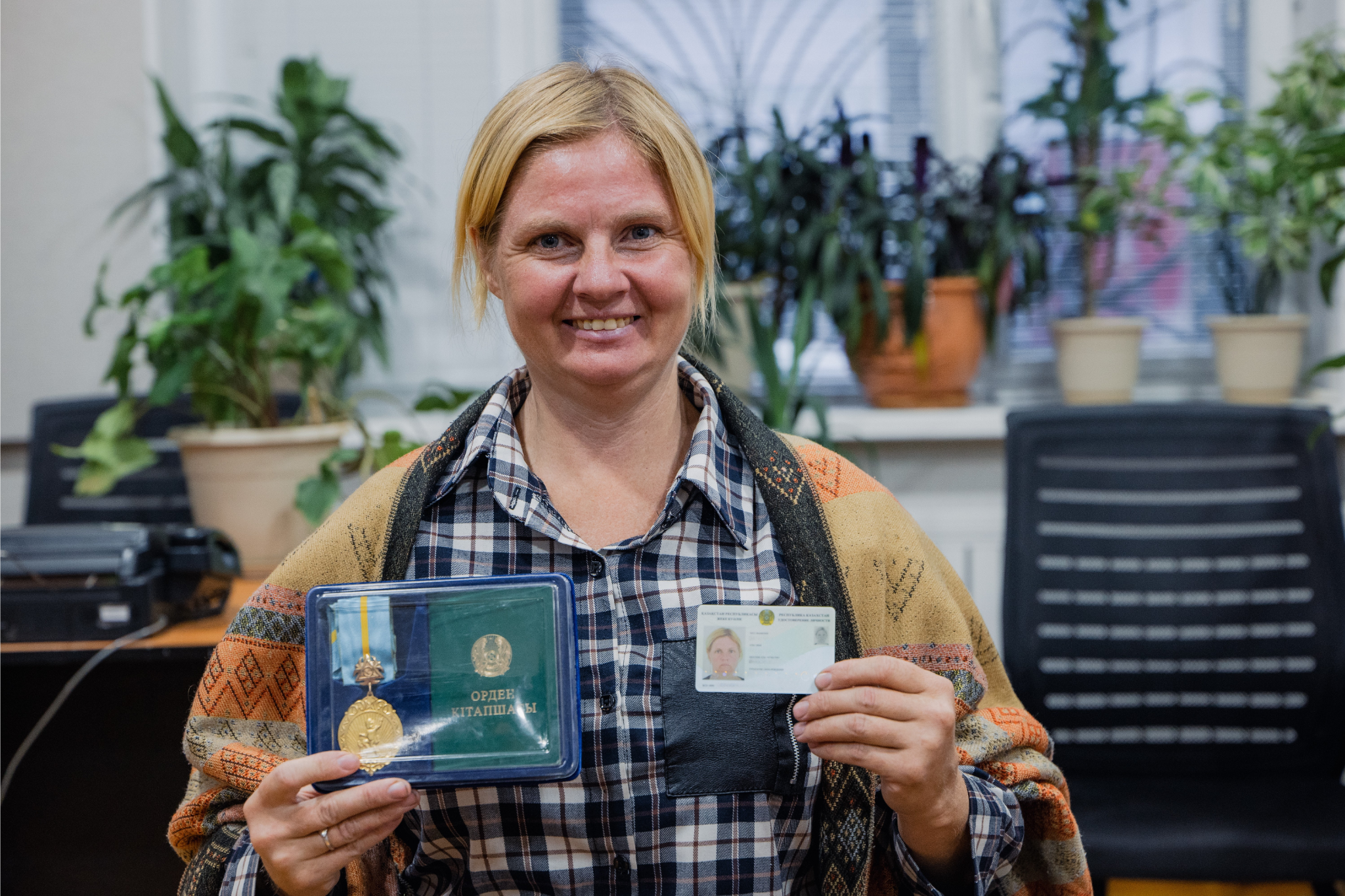Breaking the chains of statelessness for her family
Breaking the chains of statelessness for her family

At 13 years old, no one thinks that a lost birth certificate and mother’s expired passport would leave them without basic rights for two decades and affect their children too. But this is what happened to Nataliyia.
Born in the former Soviet Union, Nataliyia was 13 when she moved to Shymkent, in southern Kazakhstan, with her mother. For years they believed they were like any other citizens.
When Nataliyia turned 16, she went to the Public Service Centre to apply for a national ID. To prove who she was and where she was from, she needed to present her birth certificate and her mother’s passport. This was impossible. Nataliyia’s birth certificate had been lost many years ago, and as the Soviet Union no longer existed, her mother could not update her passport.
Nataliya discovered a devastating truth: she was not a citizen of Kazakhstan, or any country in the world. She was stateless.
Life without rights
With no proof of having a nationality or any legal status, stateless people often have difficulty accessing basic rights such as education, healthcare, employment, and freedom of movement. Statelessness leaves them in legal limbo, unable to fully participate in society. “How to live without documents, you know?” says Nataliyia. “No laws, no protection. Without documents, a person is nobody.”
“How to live without documents, you know? No laws, no protection. Without documents, a person is nobody.”
Most stateless people in Central Asia are ex-citizens of the former Soviet Union, or their descendants, who have not yet acquired or confirmed citizenship of the independent States. Others are born stateless or became stateless due to gaps in nationality laws, international migration, and mixed marriages. Statelessness can impact entire families, and span generations.
Without nationality documents, Nataliyia could not continue her education, secure a job, or even access healthcare. She was constantly fighting for the most basic rights.
Intergenerational impact of statelessness
When Nataliyia met Vladimir, life suddenly felt brighter. For a while at least, the hardships that had defined her existence seemed to fade. Together, they began a new chapter, united in their pursuit of a better future.
But, without nationality documents, Nataliyia and Vladimir were faced with barrier after barrier. They could not register their marriage, or even the birth of their children.
The plight of statelessness was passed on to the next generation. Nataliyia had nine children – all stateless, all excluded from basic rights and services.

Legal support
The young family faced many challenges. Nataliyia could not officially work, so the family had a low income, lived in a home too small for their many family members, and lacked access to any social services. “I could do only small jobs,” says Nataliyia. “Sweeping somewhere, cleaning or something else in a café.” It was not enough.
Statelessness cast a shadow over every aspect of their lives, limiting the family’s opportunities and prospects.
One day Nataliyia heard about free legal assistance for people with undetermined nationality like her, from UNHCR partner the Legal Center for Women’s Initiatives “Sana Sezim”. Although skeptical, she decided to seek their help.
And it was worth it.
With support from Sana Sezim, Nataliyia recovered her lost documents and confirmed that she had no citizenship. In 2020, she was officially recognized as a stateless person, and in 2024 became a citizen of Kazakhstan.
Family first
Having lived without identity documents – and access to basic rights and services – for two decades, Nataliya understood the urgency of confirming her children’s nationality and building a future for them – one where they would never have to experience the uncertainty and hardship she once faced.
“The first thing I did was to draw up the identity documents of my children – right away!” said Nataliyia. “I emphasized that I am a mother with citizenship, that I am a person.”
With her new legal identity, Nataliyia and her children can legally go to school, see a doctor, have a job, and apply for any social support.
As a mother of nine, Nataliyia was honored with Kazakhstan’s prestigious “Altyn Alka” (Golden Pendant) – a State award given to women who raise large families.
“When I got citizenship, I had privileges. And immediately, as a mother of many children, I was noticed, and I had rights,” she explains.

1in3: Resolving statelessness
Over the last decade, Central Asian States, supported by UNHCR, have helped more than 220,000 people obtain citizenship. Today, one in every three cases of statelessness resolved worldwide is in Central Asia.

As of January 2025, there are 7,866 officially registered stateless people in Kazakhstan.
Kazakhstan has taken significant steps to address statelessness, including changing the Marriage and Family Code so that all children born in the country can be registered at birth. In 2020 and 2024, the Migration Service Committee – supported by UNHCR and partners Sana Sezim and Kazakhstan International Bureau for Human Rights and Rule of Law – launched nationwide campaigns to identify and document people with undetermined nationality.
In 2024, Kazakhstan joined the Kyrgyz Republic, Tajikistan, Turkmenistan and Uzbekistan in adopting the Ashgabat Declaration on Ending Statelessness in Central Asia.
UNHCR supports Kazakhstan in joining many other UN Member States in acceding to the two UN Statelessness Conventions and continuing its work toward addressing statelessness through ongoing advocacy, legal reforms and collaborative efforts.
Like other aid agencies, UNHCR is affected by severe cuts in global humanitarian funding. Without donor contributions, UNHCR and partners in Central Asia will be unable to support families like Nataliyia’s to confirm or gain a nationality, or governments to advance efforts to reduce and end statelessness. UNHCR is doing everything possible to continue protecting and assisting these vulnerable groups, and is seeking additional support from donors and the private sector to sustain critical programs around the world. Funding supports families, and empowered families transform societies.

